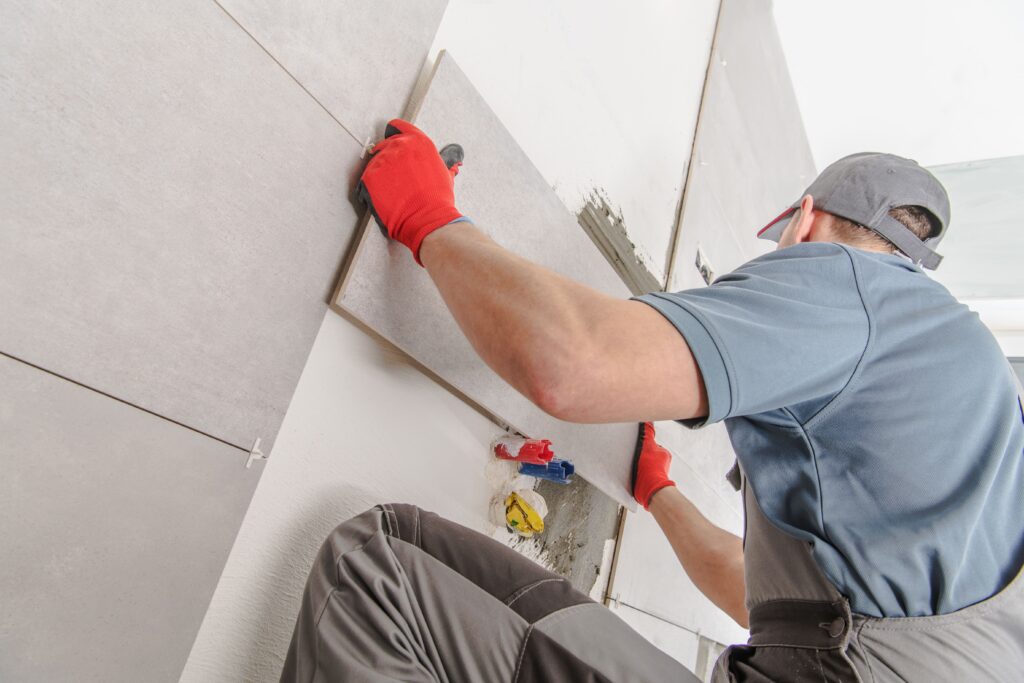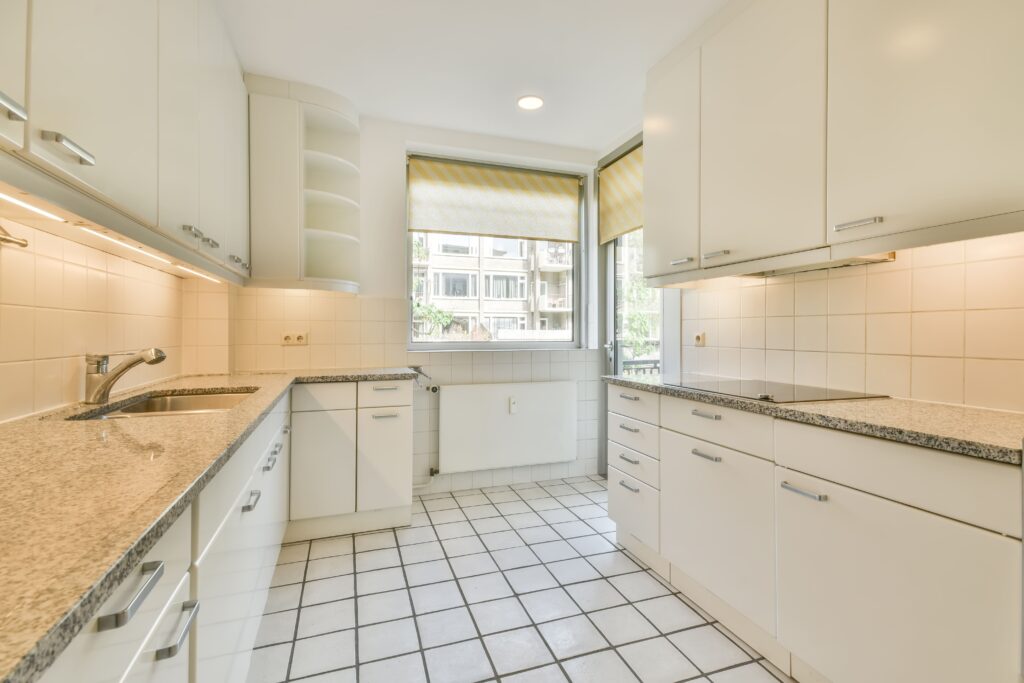Tile flooring refers to a type of flooring made up of individual tiles that are usually square or rectangular in shape. These tiles can be made from a variety of materials, such as ceramic, porcelain, natural stone, or even glass.
Tile flooring is a popular choice for many homes and commercial buildings because it is durable, easy to clean, and comes in a wide range of colors, patterns, and textures. Tile flooring can be used in a variety of settings, such as kitchens, bathrooms, entryways, and outdoor areas. It can be installed in various patterns, such as diagonal, herringbone, or straight, to create a unique and attractive look.
1. Which tile is the best for flooring?
In conclusion porcelain tiles are more recommended for the kitchen, living room, and bathroom and are the best for tile flooring.
2. Which flooring is suitable for HDB (Housing & Development Board)?
However tile is suitable for HDBs. HDB-approved homogeneous unglazed porcelain tiles are widely used in HDB for flooring.
3. How much does it cost to change floor tiles in Singapore?
As a result average cost to change the floor tiles in Singapore is $10 to $20 per square foot.
4. What are the different types of tiles available in Singapore?
Basically there are six different types of tiles available in Singapore.
- Ceramic Tile
- Porcelain Tile
- Glass Tile
- Marble Tile
- Granite Tile
- Other Natural Stone Tile
5. Is tile flooring better than laminate flooring?
Tile flooring is better than laminate flooring because tiles can withstand moisture and physical damage, whereas laminate flooring is prone to water and can damage due to external factors.
6. What is the difference between porcelain tile and ceramic tile?
Both porcelain and ceramic tiles are made from clay, but the significant difference between them is porcelain tiles are made with refined clay and fired at higher temperatures. In contrast, ceramic tiles are made with finely ground sand and clay at high temperatures.
7. How long does it take to install the tile flooring?
Likewise 10 to 16 hours are required to install the brand new tile flooring.
8. What are the best tile brands in Singapore?
Basically the best 10 tile brands in Singapore are,
- White horse ceramic
- Earth Stone Pte Ltd
- Lian Seng Hin
- Soon Bee Huat
- Hafary
- Hua Khian
- Rice Fields
- Malford Ceramics
- DiModa
- GF+A Global
9. Which color tiles are best for flooring?
Beige, cream, whites, and light shades of grey and blue are excellent choices for tile flooring. Using the same color wall and floor tiles to make your rooms appear more significant than their original size is good.
10. Which floor tiles don’t show the dirt on the surface?
Furthermore Ceramic tiles with a matte finish don’t show dirt on the tile surface.
11. What flooring lasts the longest?
Tile flooring lasts longer than other flooring types.
12. Does BTO come with tiles?
Yes, however tile flooring is the common flooring used widely in HDBs.
13. Do porcelain tiles crack easily?
Yes, porcelain tiles crack easier than standard ceramic tiles.
14. What are the disadvantages of ceramic tiles?
Even Though ceramic tiles are more robust and affordable than porcelain tiles, due to their firm surface it is hard to stand on the ceramic tiles for a long time as it can hurt our legs.
15. How much does it cost to install tile flooring in Singapore?
So the professional tile flooring installation would cost around $5 to $10 per square foot in Singapore.
16. Are porcelain tiles slippery?
Yes, porcelain tiles are slippery, but anti-slip porcelain tiles are available in the market. As a result Porcelain pavers are renowned anti-slip porcelain tiles widely used for tile flooring.
17. Which tiles are best for living room flooring?
Likewise porcelain tiles are best for living room flooring.
18. What is the lowest maintenance floor tile?
Firstly Ceramic tiles are the lowest maintenance floor tiles as they have been rugged and durable for a long time.
19. What is the PEI rating? Why do you need to consider this rating for tiles?
Basically PEI stands for “Porcelain Enamel Institute.” As a result PEI rating determines the hardness of the tiles, and PEI rating ranges from 1 to 5. Furthermore A high rating means higher hardness, indicating the tiles’ durability.
| PEI Class | Usage |
| 0 | Light-duty on walls only; never use underfoot. |
| 1 | Wall use only in residential and commercial applications. This type of tile should never be used underfoot. Shower surrounds are a typical PEI-1 tile. |
| 2 | Walls and light-duty floors. It’s often used in residential bathrooms. |
| 3 | Countertops, walls, and floors that receive normal foot traffic. It’s a good, general-purpose tile for all residential (but not commercial) uses. |
| 4 | All residential applications (both walls and floors), as well as medium commercial and light institutional locations. |
| 5 | All residential and heavy commercial and institutional foot traffic. Typically this is used only for flooring and is rarely attractive enough for interior residential applications. |
20. How much are HDB tiles?
As a result HDB tiles cost around $2 to $4 per square foot.

21. How long does porcelain tile flooring last?
Porcelain tile flooring lasts for more than 60 years. It is the longest-lasting flooring when compared with other flooring types.
22. How long does ceramic tile flooring last?
Ceramic tile flooring can last between 3 to 20 years.
23. So What is COF rating?
So COF stands for Coefficient of friction. COF ratings indicate the slipperiness of the item. Choose the tiles which have higher COFs. It is the slip-resistant indicator that you need to consider before buying tiles.
23. What type of floor tile is not slippery?
So Terracotta tile, quarry tile, and brick are the commonly used non-slippery tiles used for tile flooring in Singapore.
24. Does vinegar damage porcelain tile?
No, instead vinegar doesn’t damage your porcelain tiles. So you can use vinegar to clean the tile surface.
25. Can I walk on tile without grout?
No, instead it would help if you didn’t walk on the tile flooring without grouting. Basically It can damage or even break your tile.
26. How long after tiling can you install a toilet?
After laying ceramic or porcelain tiles on the bathroom, you must wait for at least 48 to 72 hours to install a new toilet.
27. So How long after tiling can you put furniture back?
So after installing the tile flooring, you can put furniture after 4 hours.
28. Which size tiles are best for the bathroom?
| Area | Recommended Sizes |
| Small shower floor | 1-inch square |
| Small shower walls | 1-inch square to 4-inch square |
| Moderate or large shower walls | 4-inch to 15-inch by 30-inch |
| Bathroom floor | 1-inch square to 12-inch square, or up to large-format |
| Bathroom walls | 4-inch square up to 12-inch by 24-inch |
29. Which floor is best for a bathroom?
Basically ceramic tile flooring is best for your bathroom.
30. Can you install tile directly on concrete?
Yes, however you can install tile directly on the concrete flooring.
31. What are the pros and cons of tile flooring?
Pros of tile flooring
Easy to maintain
More Durable
Water-resistant
Affordable cost
Cons of tile flooring
Basically It can absorb moisture well. So the tiles become cold.
It is heavier than other flooring materials.
So It is slippery and hard to stand for a long time, which hurts your legs.
32. What causes tiles to pop up?
So If the area is exposed to direct sunlight and poor low-quality adhesives are used to install, it makes your tiles pop up.
33. Why does my tile keep cracking?
So If your installed tiles do not have the room to expand and contract, it makes your tile crack.
34. Do small tiles make a room look bigger or smaller?
Larger tiles make a small room appear bigger because grout lines are thinner than small tiles.
35. Which is better to install the tiles: adhesives or cement?
Adhesives are better for installing tiles for more durability and problem-free installation than cement.
36. What is the best tile for kitchen floors?
So Porcelain tiles or natural stone tiles are the best tiles for kitchen flooring.
37. So can we fix cracked tiles?
Basically Fix the cracked tiles with a small amount of epoxy, and some paint will address this tiling problem.
38. Can we paint the tile?
Yes, we can paint the ceramic tiles with paints as long as it’s not exposed to water.
39. Which tile is better, porcelain or ceramic?
Porcelain tiles are better than ceramic tiles. It is more suitable for commercial use as well as for residential use.
40. Is grouting required for tile flooring?
Yes, however grouting is the basic procedure for installing tile flooring, as it can enhance the elegance of tiles and increase their durability of tile flooring.

41. Can you install tile on the wall or floor first?
You can install tiles on the wall first before installing flooring tiles.
42. What goes between tile and wall?
Grout fills the gap between tiles when installing tile flooring. Generally ultimate purpose of grout is to fill the gaps.
43. Can I use silicone instead of grout on floor tiles?
No, instead don’t use silicone as a grout for tile flooring. So use only approved grouts for the professional and perfect finish.
44. Do tiles make a house colder?
No, tile flooring doesn’t make your house colder than other types widely used for residential flooring.
45. Which can resist the heat?
Porcelain tiles can resist heat more than ceramic tiles as porcelain tiles are made up of very high temperatures.
46. Why do tiles pop up?
So if your tiles absorb more water, they may pop up as they are glued up with low-quality adhesives.
47. Is grout waterproof?
Grout is water-resistant but not waterproof.
48. Is porcelain is waterproof compare to other flooring?
Stone tiles are waterproof but porcelain tiles are even more waterproof than stone tiles.
49. Can tile stop water seepage?
So we can use Ceramic tiles, porcelain tiles, and vitrified tiles for waterproofing the walls and flooring as they are water resistant.
50. Why is tile flooring better than other flooring types?
Less wastage, suitable for all climates, more durability, and easy to clean and maintain makes tile flooring better than other flooring types.

